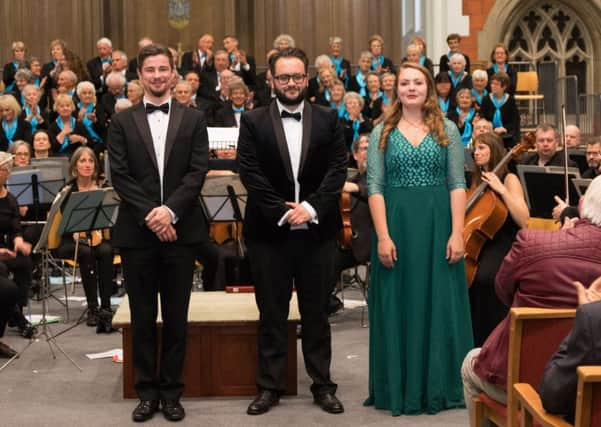Burgess Hill Choral Society in fine form for a challenging spring show


Together with the Sinfonietta of Sussex, a varied programme of opera choruses and Puccini’s Messa di Gloria entertained and uplifted an appreciative audience. Singing choruses by Verdi, Mozart, Bizet, Wagner and Puccini, all in their original languages, was a challenge well worth taking.
The demands of different vowel and consonant production for the Italian, French and German were well met, as was the Latin text in the mass.
Advertisement
Hide AdAdvertisement
Hide AdThe choir provided lovely dynamic shaping in the Voyagers’ Chorus from Idomeneo, rhythmic coordination in the famous Va Pensiero from Nabucco , an expressive communal sound in With Drooping Wings from Dido and Aeneas, a vibrant Anvil Chorus from Il Trovatore and a moving and heartfelt Pilgrims’ Chorus from Tannhäuser. The Wagner, for me, was the musical highlight of the evening.
Of the three Royal Academy of Music soloists, Meilir Jones had the required platform manner and mellifluous tone to engage the audience. Catriona Holsgrove sang in the Idomeneo extract and brought clarity of tone to Dido’s Lament which was skilfully accompanied by members of the Sinfonietta. Along with the Overture from The Marriage of Figaro, the Sinfonietta presented two movements of the Carmen suite with gusto and obvious enjoyment.
For the ever-popular Habenera, choir member Trish Symon stepped in a few hours before the concert to transport us to Seville, blowing a kiss to her conductor as she took to the stage.
Wood kept the audience up to speed on opera plots as we travelled through civilisations and centuries, most, he warned, with the likelihood of our leading lady dying of a broken heart.
Puccini composed his Messa di Gloria by time he was 21.
Advertisement
Hide AdAdvertisement
Hide AdIt marked, though, the culmination of his association with church music and was never played in his lifetime following the first performance in 1880. The benefit of a first half of operatic treats, including Verdi, allowed us to appreciate his influence on Puccini’s music. The opening Kyrie immediately demonstrated this and was lyrically performed.
The familiar Gloria progressed well and all credit to the basses in the Cum sancto spiritu section for their energetic entries. Tenor Peter Harris had the appropriate romantic timbre for the piece.
High entries for the soprani and descending strings were all precursors of what would follow in Puccini’s operas, and were handled impressively by choir and orchestra, who established an effective dialogue at the opening of the Credo.
The Sanctus united the choir before the impressive Meilir Jones led the Benedictus with dramatic intensity. A reprise of the Gloria brought an evening full of joy to a resolute close.
By Rebecca Dowden
Burgess Hill Choral Society
April 27
St Andrew’s Church, Burgess Hill